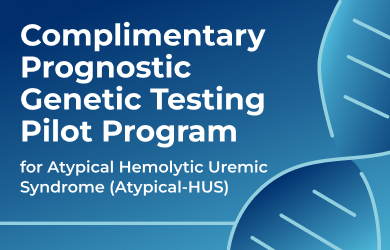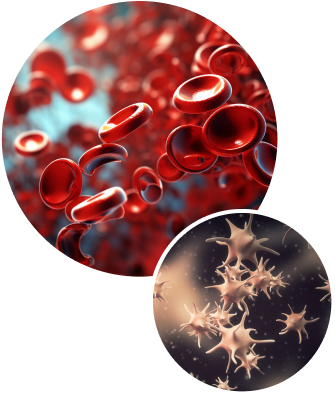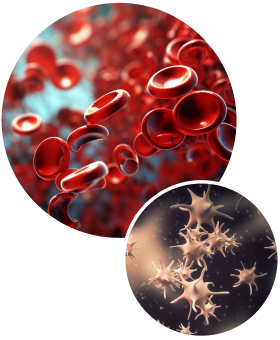

You are about to leave this page.
You are now leaving www.aHUSGeneticTesting.com. Alexion is not responsible for content included on third-party websites. Do you want to proceed?




This is sponsored, no charge genetic testing and counseling, for a limited time period in the United States (US).
The atypical-HUS Complimentary Prognostic Genetic Testing Pilot Program offers high-quality, disease-specific genetic testing and genetic counseling services to those diagnosed with atypical-HUS to help inform on long-term prognosis, monitoring, and management decisions.
This pilot program was created to provide equal access to up-to-date and high-quality genetic testing and counseling to all atypical-HUS patients to help them make more informed decisions about their health with their medical provider.
Key: ADAMTS13, a disintegrin and metalloproteinase with thrombospondin type 1 motif, 13; C2, complement component 2; C3, complement component 3; C3AR1, complement component 3a receptor 1; C4BPA, complement component 4 binding protein alpha; CD46, cluster of differentiation 46; CFB, complement factor B gene; CFH, complement factor H gene; CFHR1, complement factor H-related 1; CFHR1-4, complement factor H-related genes 1-4; CFHR2, complement factor H-related 2; CFHR3, complement factor H-related 3; CFHR3-1, complement factor H-related genes 3-1; CFHR4, complement factor H-related 4; CFHR5, complement factor H-related 5; CFI, complement factor I gene; DGKE, diacylglycerol kinase-ε; INF2, inverted formin 2; MLPA, multiplex ligation-dependent probe amplification; MMACHC, metabolism of cobalamin associated C; PLG, plasminogen; THBD, thrombomodulin gene; TSEN2, tRNA splicing endonuclease subunit 2; VTN, vitronectin; MCP, membrane cofactor protein gene; WT1, Wilms' tumor 1 gene.
atypical-HUS, atypical hemolytic uremic syndrome.
 Diagnosed with atypical-HUS by way of ICD-10 code D59.39
Diagnosed with atypical-HUS by way of ICD-10 code D59.39 Had ADAMTS13 activity testing completed and thrombotic thrombocytopenic purpura (TTP) ruled out
Had ADAMTS13 activity testing completed and thrombotic thrombocytopenic purpura (TTP) ruled out  Ordering physician's practice must be in New York, California, Florida, or Texas
Ordering physician's practice must be in New York, California, Florida, or Texas Patients must consent
Patients must consent Diagnosis as STEC-HUS at time of TMA presentation, without a diagnosis of atypical-HUS
Diagnosis as STEC-HUS at time of TMA presentation, without a diagnosis of atypical-HUS Patients not agreeing to consent
Patients not agreeing to consentICD-10, International Classification of Diseases Tenth Revision; STEC-HUS, Shiga toxin-producing Escherichia coli-associated hemolytic uremic syndrome; TMA, Thrombotic microangiopathy.
Online, paper, or phone enrollment options are available. To enroll a patient via phone, call Machaon Client Services at the number below. Prior to specimen collection, please ensure all eligibility criteria are satisfied.
Buccal swab or blood collection kits containing instructions and a prepaid return postage label can be sent. Additionally, 1 mL to 3 mL of ethylenediamine tetraacetic acid (EDTA) whole blood can be drawn (lavender top tubes). Please call Machaon Client Services for proper specimen collection, shipping requirements, and a prepaid return shipping label.
The patient’s specimen should be packaged along with the enrollment form and sent to Machaon Client Services using the prepaid return shipping label.
Receive results based on the preferred method determined during the enrollment process. Clinical consultation services and genetic counseling can be scheduled as needed.
Atypical-HUS is a life-threatening condition with continuous risk of complement-mediated thrombotic microangiopathy (TMA), characterized by microangiopathic hemolytic anemia, thrombocytopenia, and organ damage.2,3 Atypical-HUS develops as a result of exposure to factors or conditions that trigger complement overactivation, and/or a patient’s genetic predisposition to complement dysregulation.2-4
For optimal patient outcomes, early recognition and appropriate management are critical to reduce the risk of irreversible organ damage or death.2 If left undiagnosed, atypical-HUS has a high degree of morbidity and mortality.3 Outcomes for patients with atypical-HUS receiving plasma exchange/plasma infusion are poor; 56% of adults progress to end-stage kidney disease (ESKD) or die within 1 year, and up to 70% with certain mutations have ESKD or die within 3 years.5,6
Atypical-HUS remains a clinical diagnosis.7 About 40% of patients with atypical-HUS do not have an identified genetic mutation, hence genetic testing for diagnosis has limitations.3,8 As mutations continue to be discovered, some of these individuals may prove to have a genetic component.9,10


While detection of a genetic variant has limitations, it can provide guidance around the management of disease and prognosis. Patients with atypical-HUS carrying certain genetic mutations experience poorer prognoses.11 Patients with identified mutations are associated with a higher risk of TMA recurrence, ESKD progression, and death within the next year after the first episode.8,12
The risk of TMA recurrence is increased after a renal transplant with certain mutations.7,11 Clinical outcomes of unmanaged patients with atypical-HUS carrying identified genetic mutations are outlined in the following chart.11
| Gene | Risk of death or ESKD within the next year after first episode | Risk of aHUS recurrence | Risk of aHUS recurrence after renal transplant |
|---|---|---|---|
|
CFH or CFH-CFHR1/3 hybrid genes
|
50%-70% | 50% | 75%-90% |
|
MCP single
|
0%-6% | 70%-90% | <20% |
|
Anti-FH
|
30%-40% | 40%-60% | Higher with increased antibody titers |
|
CFI
|
50% | 10%-30% | 45%-80% |
|
C3
|
60% | 50% | 40%-70% |
|
THBD
|
50% | 30% | ? |
|
CFB
|
50% | 100% | 100% |
Key: aHUS, atypical hemolytic uremic syndrome; Anti-FH, anti-complement factor H antibodies; C3, complement component 3; CFB, complement factor B gene; CFH, complement factor H gene; CFHR, complement factor H-related genes; CFI, complement factor I gene; ESKD, end-stage kidney disease; MCP, membrane cofactor protein gene; THBD, thrombomodulin gene.
Adapted from Abbas F, et al. World J Transplant. 2018;8(5):122-141 and Campistol JM, et al. Nefrologia. 2015;35(5):421-447.
Atypical-HUS, atypical hemolytic uremic syndrome.
Aside from genetics, it is recommended to also assess the patient's family history of TMA, current renal status, and other risk factors of TMA, such as pediatric onset or pregnancy, to appropriately define prognosis.12
Learn more: ahussource.com/physician/
The information in this presentation is intended as education information for healthcare professionals. It does not replace a healthcare professional’s judgment or clinical diagnosis.


